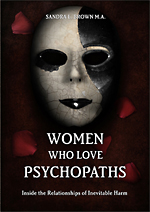I heard a universal ‘sigh of relief’ go out around the world as women read the title of this article. Don’t you feel better knowing there really IS some science backing the whole issue of having way too much empathy?
When we began writing about women who love psychopaths, anti-socials, sociopaths and narcissists, we already ‘assumed’ that maybe you did have too much empathy (as well as other elevated temperament traits). We just didn’t know how much, or why. When we began the actual testing for the research of the book ‘Women Who Love Psychopaths’, we learned just ‘how much’ empathy you had.
Do I need to tell you? WAY TOO MUCH!
By now you have probably already suspected that your super-high empathy is what got you in trouble in this pathological relationship. But, did you know there is hard science behind what we suspected about what is going on in your relationship with your super-trait of high empathy? It really IS all in your head – and your genes.
In fact, these genes influence the production of various brain chemicals that can influence just ‘how much’ empathy you have. These brain chemicals include those that influence orgasm, and it’s effect on how bonded you feel, while also influencing some aspects of mental health (No, no! That is not a good mix!).
Other brain chemicals influence how much innate and learned fear you have. However, females don’t seem to assess threats well, and the chemicals then increase her social interactions while at the same time she is not assessing fear and threats well (This is not a good thing!!).
One of the final chemical effects delays your reflexes (like not getting out of the relationship), and also impacts your short and long term memory (how you easily store good memories that are very strong, and how you store bad memories which are easily forgotten). And, since it is genetic, it can run in entire families that produce ‘gullible’ and ‘trusting’ individuals who seem to just keep getting hurt.
Of course, the reverse is also true. Genes can influence the absence of various brain chemicals that influence ‘how little’ empathy a person has. We already know in great detail how this affects those with personality disorders. Personality disordered people (especially Cluster B disorders) struggle with not experiencing, or not having any empathy.
Over the past few years, the magazine has been writing about various aspects of personality disorder and the brain. This has included the issue of brain imaging. What we are finding out is how brain structure and chemicals can affect personality, empathy, behavior, and consequently, the behavior in relationships. As advances are made in the field of neurobiology, we are learning more and more of what The Institute has always believed – that there is a lot of biology behind personality development issues such as personality disorders. Genetics and neurobiology are proving that behavior associated with narcissism, borderline, anti-social personality disorders, along with psychopathy has as much to do with brain wiring and chemistry as it does with behavioral intent.
The Institute has long said to survivors that personality disorders are not merely willful behavior, but brain deficits that control how much empathy, compassion, conscience, guilt, insight, and change a person is capable. Autism and personality disorders share a common thread as ’empathy spectrum disorders’ now being studied extensively within the field of neuroscience. But, in some opposite ways, the women also share a common thread of an empathy disorder – hyper-empathy. We are coming to understand that hyper-empathy has much to do with her innate temperament (you come into the world wired with the personality you have), genetic predispositions to high or low empathy, and brain chemistry configurations that contribute to levels of empathy. The old thinking which assumes women with high empathy are merely ‘door mats’ is not scientifically correct when looking at current studies.
Neuroscience, with all its awesome information, has the dynamic power to blow us all out of the murky waters of assuming that our behavior is merely a reflection of our will. As neuroscience graces our minds with new understanding of how our brains work, it brings with it incredible freedom to understand our own traits, and the pathological traits of others.
For a mind blowing book on the genetic and neurobiology of not only personality disorders, but ‘evil’ as well, read Barbara Oakley’s book, Evil Genes, or her latest book on hyper-empathy entitled, Cold-Blooded Kindness.









